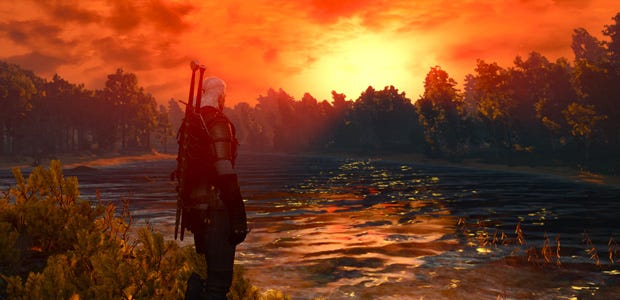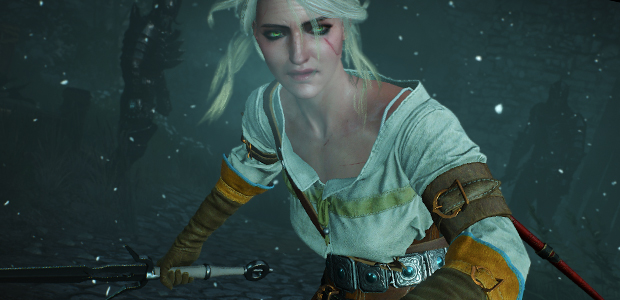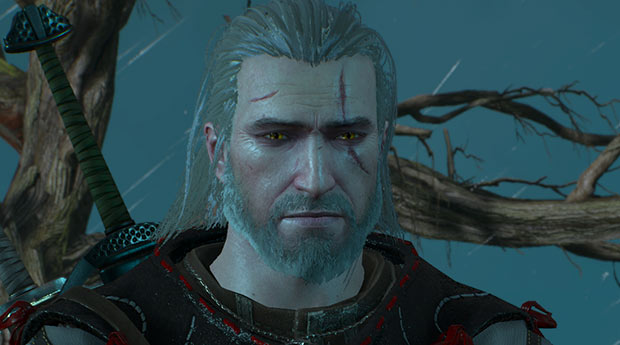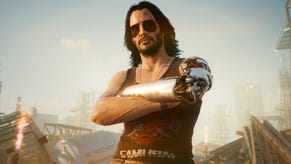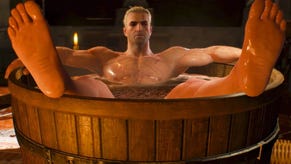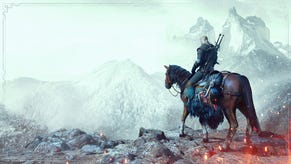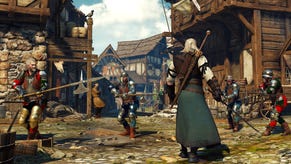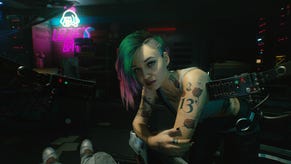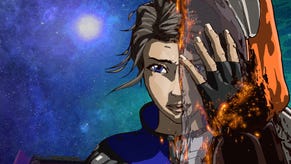The Witcher 3: Wild Hunt - Looking Back With Spoilers
Every Witcher way but lose
Many games suffer from a little bit of distance. You play them and they seem great, but once the novelty has faded, so has part of their soul. I'd say Dragon Age: Inquisition is a good example there. It's a game I enjoyed, but it's also one I've not really thought about since its credits rolled.
With The Witcher III: Wild Hunt [official site] though, the scale of CD Projekt's accomplishment still hasn't fully sunk in, and probably won't until the next big RPG that doesn't live up to the many, many amazing bits of design that game offers. I'm of course talking of the big stuff, like its sweeping plot and open world. More though, I'm thinking of the details; the smaller stuff, like how the scripting system is advanced enough to stop a fight after a specific comment of "Wait, you're Geralt?!" or the exquisite attention to detail on even the smallest of quests. It's CD Projekt's masterpiece; the Witcher experience they've been working towards since getting the license all those years ago.
And now it's been out for a while, let's look at some of the more spoilery bits.
Now, I started with that praise just to make it clear how much I both loved playing through the game, and massively respect the achievement of it. Oddly, in many ways The Witcher III does itself a disservice by making it all look so easy, so fluid, so natural, that it's the slightly crap moments that stand out to be counted. The terrible levelled content early on for instance, where basic bandits are ludicrously powerful compared to Geralt. The deeply unfortunate decision to make the first area small and artificially cramped, hiding the fact that for most of the game you're in a sprawling open world that almost never demands a loading screen. The tedious rehashing of plot on those loading screens. You know the stuff I mean. When something annoys here, it's all the more jarring for it.
Which brings me to the main story. My biggest complaint about The Witcher III - and goodness, is this not a horrible one - is that in trying to do so much, its core does rather tend to suffer. It's a fantastic game about Geralt the monster-slayer. It's not so hot as a story about Geralt and Ciri, and much of that is down to utterly horribly pacing. The quest to find her is just so damn long and with so many distractions that her fate quickly fades into the distance. The threat of the Wild Hunt may as well not even exist, being glimpsed briefly in one early quest, getting sidelined until nearly the end, and not being particularly scary even at that point. The Witcher III also never quite recovers from its fake-out ending at Kaer Morhen, where you cash in every chip and call in every favour for what's quite clearly the final battle... only to find out that you've still got several hours left. Adrenaline backwash isn't a pleasant thing to swim through, especially for so long.
This final section is also something of a let-down due to a problem that's plagued CD Projekt since the start of the series - its difficulty bringing in both existing Witcher fans and those who've never read the books. The Witcher III does it far better than its predecessors, and it has no trouble making Ciri a cool character play and to spend time with. It's terrible though at conveying what book readers know about her, which becomes a real issue when the final act sets out to switch things around so that the Wild Hunt and the more metaphysical threat both become her story rather than Geralt's.
With the original game, and in particular all the stuff with Alvin, it was easier to brush this kind of thing off - you wouldn't for instance expect a Star Wars game to stop the action to explain what The Force is. The Witcher was very much a game of that ilk, aimed primarily at the legions of fans outside the English speaking world. By The Witcher II though, it had grown, with The Witcher III in particular being one of the biggest games of the year, and with all due respect to Sapkowski's work, that's entirely down to CD Projekt clambering from unknowns to the top tier of game development. (For comparison, you'll note that the Game of Thrones RPG got zero attention back in 2012).
To give proper credit, CD Projekt has gotten much better at this over the years, with the move away from politics to a more bashy-smashy monster story definitely in The Witcher III's favour. Even outside of that stuff though, it regularly pulls it off superbly. The quest "The Last Wish" is probably its best moment. If you've read the books, you know exactly what it refers to. If not, Geralt and Yennefer quickly set things up without too much "As You Know" dialogue, creating a quest that's heartwarming whether you know of them, or only met Yennefer for the first time in the intro. It's also pretty good at re-establishing what happened in the previous games by showing rather than simply telling, despite how much variance was possible from the complex web of politics and character choices.
With Ciri and much of what surrounded The Wild Hunt though, I often felt that element of being out of the loop and the drama of the big moments and reveals suffered for it. The fact that the big reveal is so tied to her background and relationships and insecurities that we've not really seen while she was busy exploring the world as a magical murder machine don't really help. This may be a case of expecting Darth Vader to pause for a moment to go "BY THE WAY, I'M LUKE'S DAD - YOU KNOW, THE HERO AND STUFF", but it did detract from both the drama of the ending and the emotional hook of her various fates once no longer imprisoned by being the Lady of the Worlds.
Even in the lesser parts though, I'm not saying The Witcher III did things badly, just not quite up to its own normally amazing standards. Alec has already written about the amazing Bloody Baron storyline, with its fascinating mix of brutality and sympathy for the devil. Most games would be proud to just to have that, but of course The Witcher III has so many more - the horrible story of Skjall for instance, the falsely accused craven, the vampire lord and his sadistic serial killing spree, the witches of the woods and their rivalry with another ancient spirit where human morality has no place, the plague spirit who tries to con Geralt into freeing her by playing the damsel card...
That actually ties into one of my favourite things about the whole game - just how much respect it has for its characters. The Witcher III obviously has fun with fan-service on a fairly regular basis, but never mind that. Even in those cases, there's more to the characters than a weak 'oh, well, sorceresses just like to look sexy' level excuse - Keira Metz for instance quickly moving from that to focus on her frustration with her current state and desire for both immediate and long-term escape, just as Triss is seen primarily as a key member of the magical resistance and a powerful figure first, a potential notch on Geralt's bedpost second. You don't simply make a strong female character by literally making them strong, though certainly the sorceresses are - all the leads are given the equality of flaws, respect, and crucially, being fun that so often eludes the genre. Yennefer especially is wonderfully written, managing to convey both the sentiment towards Geralt and more importantly Ciri that their relationship needs, and the pragmatic coldness that lets her backstab whole communities and work with the enemy without so much as a second thought.
And god, is it a funny game. It's easy to see it as bleak, with all the racism and warfare and cruel decisions, but in practice this so often acts as something for the writers to bounce humour off. There's more warmth in The Witcher III than most games even get close of, from the friendship of comrades in arms whether they're in a no-win situation or not, to random moments of comedy like the Witchers stealing Yennefer's clothes to drunk-dial people over her magical phone, to Geralt persuading her into a terrible pun-war, to taking a turn as a flamboyant bandit to... oh, so many great moments. As much as the plot's pacing issues meant I soon forgot about the Wild Hunt in anything but a "I wonder when they'll actually appear" kind of way, the constant flow of surprises stopped the wild-goose chase ever entirely wearing out its welcome.
Not every bit of writing is a home-run of course, with Ves especially coming across as a moron this time. Those slips are relatively rare though, and perhaps there's no better small example of how much CD Projekt's writers have come on over the years than when trying to track Dandelion through his list of recent conquests - the joke of how many there are being a funny one, but everyone on the list then being treated like people rather than objects of fun. That includes the cross-dressing tailor who gets to tell jokes without being one, not least getting to tell the tale of Kalkstein's death and why you don't want to burn an alchemist at the stake without checking their pockets.
One of the best often overlooked bits of writing though has to be Geralt himself. I spent a bit of time after finishing The Witcher III replaying bits of the first games, and in the English language versions at least... goodness, what a jump up. The series has often struggled to convey the subtlety of his character - a man playing the role of an emotionless killer who gives no shits for politics, rather than actually being that. As much as it would make his life endlessly easier.
Here that comes across beautifully, especially in conversations with 'monsters' like godlings where he can let his guard down and let his compassionate side show without fear, in reunions with old friends who he's finally back on an equal footing with after recovering his memories (a particularly fine line being Triss expressing how glad she is that nobody will be able to manipulate his ignorance any more, while casually mentioning that of course she's been doing just that, as if she'd be able to hold her head up high around her fellow sorceresses if she hadn't) and the options to break neutrality in the face of particular obscenities. True, the Geralt of the books would never be quite as pliable as player option allows him to be here, in particular when it comes to turning down a fee, but it works. His careful monotone is layered with a surprising amount of sentiment, backed up by some great facial acting in key moments. I mean, just look at this, from the Baron questline:
That's amazing character work, right there - the mix of resignation and sadness encapsulated just in Geralt's eyes, away from any actual plot detail. The fact that CD Projekt can do the same in tragic and comedy sequences are amazing, as well as convey key moments with silence and unspoken texture. Scenes like trying to maintain a cover while Triss is being tortured show the range beautifully, as do the warm moments when he's finally reunited with Ciri. I don't think anyone has ever done a better RPG protagonist, perfectly balanced between personality and player freedom.
On top of that though, it's worth pausing for a moment just to acknowledge how impressive it is that CD Projekt manages to make him so consistent across so many different types of story and so many hours. I can't remember a single moment where I suddenly felt that Geralt had been swapped out for an infiltrator, or was just a generic mouthpiece. To make the whole thing so much his story deserves major praise, grounding everything you see in a way that makes the pain and suffering and moments of relief feel real and important and worth caring about, not just vectors for more delicious XP.
Which brings us to the ending proper. Endings, I should say. The one I got saw Ciri successfully facing down the White Frost, the apocalyptic yet poorly established in-game threat beyond the Wild Hunt. Overall, I liked it, even though there was a fair whack of "If you don't know all of this already, it's not for you," in the telling. Yes, a lot of the details are in the game, but I still felt a bit left out.
That said, it worked for me. In my game, Geralt had been supportive to Ciri, so she went to her destiny beyond him with a heart full of hope and confidence, and I actually liked that the epic battle took place off screen. It reminded me a bit of how I wanted The Walking Dead Series 1 to end. Here, Geralt's job is to prepare Ciri for her fight, but he can't be there with her for it. Therefore, nor can we. Whether she wins or loses that battle, it's hers - the child surpassing the parent.
From then, she went on to become a Witcher in her own right - Geralt giving her a sword that would be much more touching if we weren't certain she'll sell it in three hours time once she out-levels it, but NEVER MIND. For me, that's the ending that works best. Watching the others on YouTube, I'm less taken by Ciri becoming the ruler of Nilfgaard, largely because she hasn't had a whole lot of time during the game to show authority that would come to bear in that role, and the idea of a ruler with a good heart becomes slightly less warm in the face of The Witcher universe's shades of grey. Conversely, I found putting Cerys an Craite in charge of Skellige quite fitting because by that point she'd demonstrated enough skills to lead well.
(It's also a little undercut by the fact that in-game Nilfgaard is rarely shown to be that bad, with the real problems for most of the people you meet coming from the likes of Radovid. Even only a glancing knowledge of the books quickly shows a much darker side to them.)
Finally, the bad ending of Geralt effectively committing suicide by monster... I'm glad I didn't get that one, but it seems pretty fitting as well. The game has reinforced time and time again that he's largely a relic who fights purely because it's what he's made to do, but that crushing blow at losing Ciri... yeah. If anything was going to push him over the edge, it was going to be that. In some ways, such a brutally bleak ending, lacking in any heroism save having at least tried, is appropriate. I'm glad it's officially the 'bad' ending though, because what tends to ripple throughout the game far more strongly is how much heart it actually has - the chance for warmth in the cold, the importance of friendship in a cynical world, the price and reward of loyalty. Geralt deserves something after all of his trials, and I can't think of anything better or more fitting than knowing his legacy continues and has found satisfaction, be it as an Empress, or a Witcher who happily follows his teachings and code by her own free will. After all, what use has he for gold and jewels except to trade in for yet another slightly better silver sword? The Witcher 3 lets him retire with something accomplished, that can never be undone by the likes of Radovid's scheming or Weavess' potential revenge plans.
In short, I like the ending a lot. It's not the heroic sacrifice I was expecting, but it's the quieter, more understated finale the series needed - a passing of the torch, a passing into a new era. As the quest itself declares, something ends, something begins. Well, after the DLC is all finished, anyway.
Of course, The Witcher III has its running problems. The combat is far too hard early on and then becomes far too easy long before the midpoint of the game, some specific quests aren't as good as others, and it does have a tendency to rather boringly rely on "Use your Witcher senses to-" where it would be much more fun to actually, y'know, do stuff. The quests in particular would be a lot more fun if they weren't so completely guided and had instead taken a bit more of a simulator approach to tracking foes and preparing for battles and otherwise acting like a Witcher rather than a sword-slinging psychic with the world's first GPS embedded into his mop-haired bonce.
Overall though, I loved it while playing it, and I can't wait for the DLC. I know it's currently a bit up in the air as to what CD Projekt has planned for the series - talk of this being Geralt's last story, but still leaving things open for a return to the world. Honestly, I kinda hope this is it. It's the culmination of everything it's been working towards, and a finer cap you couldn't hope for. At this point, what I want to see more than anything else is to see it clear the table and start afresh, putting all those hard-earned lessons into practice on something without the baggage of both the books and its own previous games. Cyberpunk 2077 should be amazing, but what I can't wait for is what comes after that. It's a good thing it's still some way off, giving the competition a chance to catch up.
Oh, and no. I still haven't gotten around to playing Gwent. Sorry.
